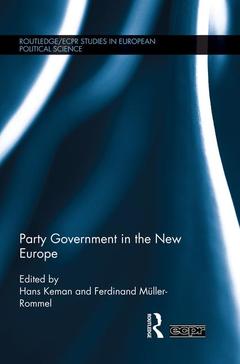Description
Party Government in the New Europe
Routledge/ECPR Studies in European Political Science Series
Coordinators: Keman Hans, Muller-Rommel Ferdinand
Language: English
Subject for Party Government in the New Europe:
Keywords
Party government; European union; Democracy; Parliament; Veto Player Approach; Unemployment Replacement Rates; Vice Versa; Strong Left Parties; Party System Institutionalisation; Pension Replacement Rates; Median Voter Position; Federal Republic Of Germany; Cee Country; Post-communist Democracies; Executive Party Dimension; Comparative European Politics; Hans Keman; Welfare State Retrenchment; Veto Players; Fuzzy Set Analysis; Political Parties; Partisan Theory; Partisan Effects; Policy Issues; Fuzzy Set Methodology; Data Set; Net Replacement Rates; West Germany
Publication date: 04-2015
· 15.6x23.4 cm · Paperback
Publication date: 05-2012
192 p. · 15.6x23.4 cm · Paperback
Description
/li>Contents
/li>Readership
/li>Biography
/li>
This truly comparative volume examines the "life cycle" of party governments in Europe from 1990 onwards, and analyses its role and function in contemporary European parliamentary democracies.
The life and the performance of party governments in Europe became more and more volatile and publicly contested. In some cases, it has even challenge the democratic quality of the state. This book presents comparative analyses of party governments from formation and duration, to performance. It brings together some of the foremost scholars researching on party government to evaluate existing theories and compare both the developments in the Western and the ?new? Eastern Europe in an empirically-grounded comparative analysis. The book discusses the interaction between various institutions, political parties and policies, and evaluates how institutional change and party behaviour can drive the "life cycle" of party government.
Party Government in the New Europe will be of interest to students and scholars of Comparative Politics, Democracy, Government and European Politics.
I Changing patterns of party government 1. The Life Cycle of Party Government across the New Europe Hans Keman and Ferdinand Müller-Rommel II Party government and democratic governance 2. Party Government and Parliamentary Democracy in the New Europe Ian Budge and Michael McDonald 3. Dimensions of Government Decision-Making Structures in OECD Countries Detlef JahnIII Interaction of party government with parties and interest organizations 4. Party System Institutionalization across Time in Post-Communist Europe Fernando Casal Bertoa and Peter Mair 5. The Impact of Political Parties on Labour Relations: European Post-Communist Democracies in Comparative Perspective Klaus ArmingeonIV Party government and public policy 6. Political Parties and the Welfare State in Western and Post-Communist Democracies Manfred Schmidt 7. Party Government and Welfare State Reforms: A Configurational Approach Paul PenningsV Research Perspectives, Data Developments and Conclusions 8. Enhancing and Improving Data on Party Government Jaap Woldendorp 9. Comparative Observations, Empirical Findings and Research Perspectives Ferdinand Müller-Rommel and Hans Keman
Hans Keman is Professor and Chair of Comparative Political Science at the VU University Amsterdam, the Netherlands.
Ferdinand Müller-Rommel is Professor of Comparative Politics and Director of the Center for the Study of Democracy at Leuphana University Lüneburg, Germany.




